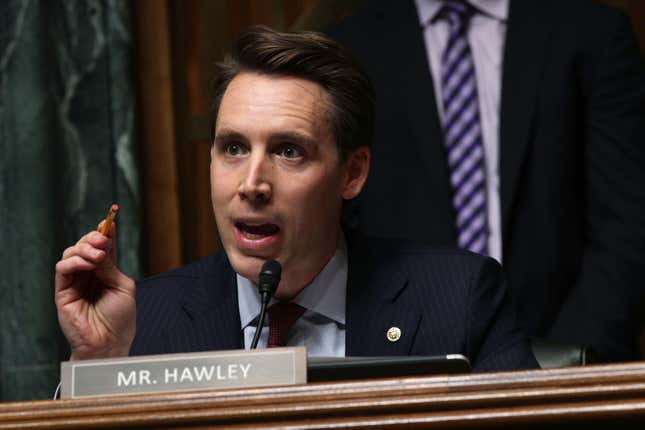
As expected, Republican Senator Josh Hawley from Missouri has introduced a bill that would ban the inclusion of “pay-to-win microtransactions and sales of loot boxes in minor-oriented games” as well as to games that publishers believe kids play. It would not affect cosmetic items and also has a long way to go before it could become law.
Hawley outlined the bill in an interview published earlier this week on Kotaku, telling our Jason Schreier that game publisher executives who promote lootboxes and pay-to-win microtransactions are “basically adding casinos to children’s games.”
The text of Hawley’s bill was released today. It defines a pay-to-win microtransaction as one that:
... with respect to an interactive digital entertainment product that, from the perspective of a reasonable user of the product, is a game offering a scoring system, a set of goals to achieve, a set of rewards, or a sense of interactive progression through the product’s content including but not limited to narrative progression—
(I) eases a user’s progression through content otherwise available within the game without the purchase of such transaction;
(II) assists a user in accomplishing an achievement within the game that can otherwise be accomplished without the purchase of such transaction;
(III) assists a user in receiving an award associated with the game that is otherwise available in association with the game without the purchase of such transaction; or
(IV) permits a user to continue to access content of the game that had previously been accessible to the user but has been made inaccessible after the expiration of a timer or a number of gameplay attempts; or
(ii) with respect to an interactive digital entertainment product that, from the perspective of a reasonable user of the product, is a game featuring competition with other users, provides a user with a competitive advantage with respect to the game’s competitive aspects over users who do not make such a transaction.
The prohibited microtransactions would not include higher difficulty modes, cosmetic items or add-on content.
The affected microtransactions, along with lootboxes, would be barred from “minor-oriented games.” Which games would those be? The bill does not refer to game ratings such as E or T and instead defines the targeted games as those “for which the target audience is individuals under the age of 18.” Games that are played by adults could be viewed as highly appealing to minors and could be impacted.
The bills co-sponsors include two Democrats, Ed Markey of Massachusetts and Richard Blumenthal of Connecticut, the latter of whom in 2010 supported the California-led effort to ban the sale of violent video games to minors. That state law was ruled un-Constitutional by the Supreme Court for violating the artistic expressions protected by the freedom of speech.
Hawley’s bill will go to committee and will then involve a long process of hearings and multiple votes before it has a chance of becoming law.
You can read the full bill here.
Update - 12:31pm, May 24: The breadth of Hawley’s bill has triggered criticism by readers and members of the games industry because it doesn’t just attempt to regular games made for kids but those in which the publishers have “constructive knowledge that any users are under 18.” That “constructive knowledge” term means that the publishers would have a belief (without even having to confirm) that children play the game.
Because of that, it’s not just games made for kids that would be impacted but games marketed to adults that kids also like that would be affected. We’ve updated this article’s headline and first sentence to better emphasize that.
The Entertainment Software Association, the game publisher lobby that engages with government and hosts the annual E3 show criticized the bill for its breath. According to a statement from ESA CEO Stanley Pierre-Louis:
“This legislation is flawed and riddled with inaccuracies. It does not reflect how video games work nor how our industry strives to deliver innovative and compelling entertainment experiences to our audiences. The impact of this bill would be far-reaching and ultimately prove harmful to the player experience, not to mention the more than 220,000 Americans employed by the video game industry. We encourage the bill’s co-sponsors to work with us to raise awareness about the tools and information in place that keep the control of video game play and in-game spending in parents’ hands rather than in the government’s.”